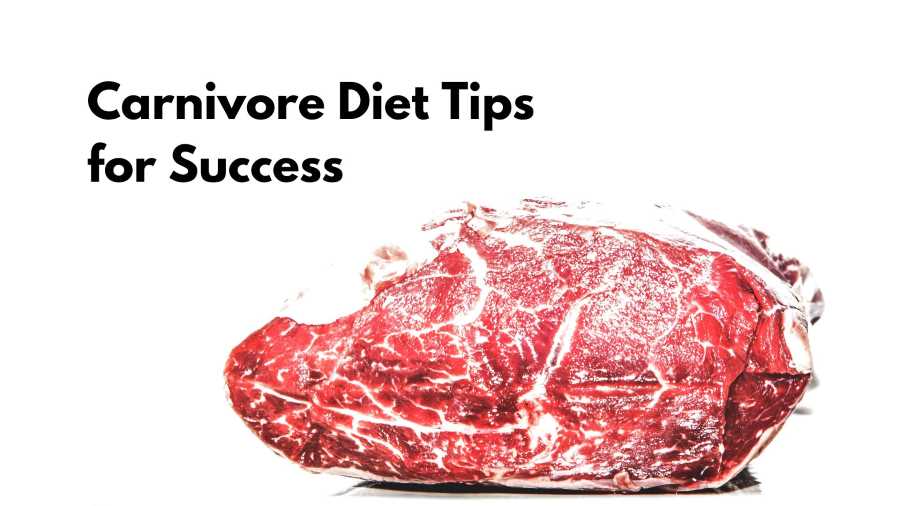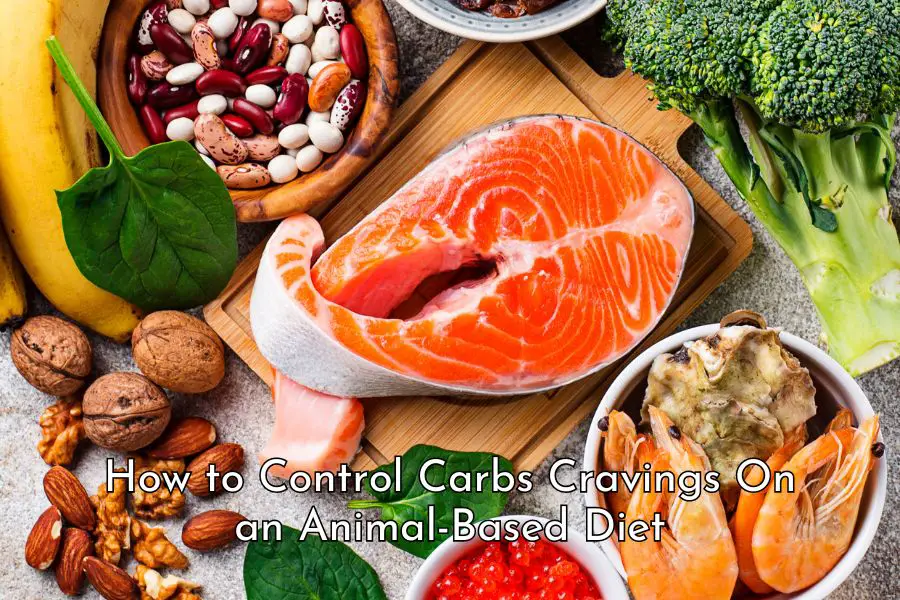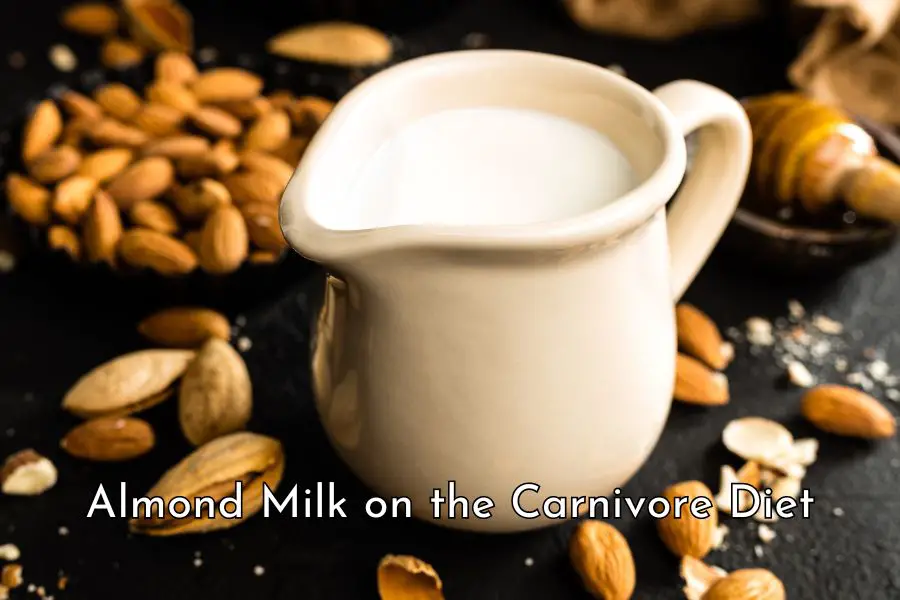Here are 15 tips to help people who are new to the carnivore diet get started and go through the adaptation phase easier with a better chance of success.
1. Go strict carnivore
My number one recommendation for you is to go strict carnivore straight away and that means just eating meat, drinking water, and salting your meat if desired.
That also means cutting out all plant food, processed sugar, processed meat, and all drinks that are not water.
The advantage of this strict diet is that, although you will initially go through some tough times to adapt to this diet, you will likely see immediate benefits and will be motivated by early success to keep going.
If you do it half-heartedly, you won’t see the results that people are talking about and may come to a premature conclusion that this diet is not for you.
2. Be fully committed for a short period of time
Eating nothing but meat may be hard for some but if you make a short-term commitment like just 30 days, or 60 days and reassess afterward, it doesn’t appear to be so daunting.
Print out a 30 days habit tracker and tick the days off as you go. Thirty days will be over soon enough.
Although 30 days may be not enough for you to fully recognize the benefits of this diet, it is likely long enough to make a significant difference in your health and how you feel, especially if you come from a vegan or a standard Western-style diet.
3. Go ruminant-based
The best meat to eat on the carnivore diet is ruminant meat like beef, lamb, goat, bison, and buffalo because they are generally raised in better conditions than pigs, poultry, and fish and have better nutritional profiles.
If you can afford 100% grass-fed, of course, you should choose grass-fed meat because it has a better fatty acid profile and antioxidant content and is likely to contain a lower level of contaminants like pesticides, herbicides, and antimicrobials.
But if you can’t, rest assured that even grain-fed meat is still one of the most nutrient-dense foods ever that you can eat.
In the beginning, just eat ruminant meat and drink water. It is not just more nutritious than other meat choices but it is also very rare that people have sensitivity problems with beef, lamb, or goat.
You certainly can experiment with other food like pork, poultry, fish, eggs, or dairy later on if you wish once you are over the adaptation phase.
4. Add organ meat
If you are able to, add a few small servings of organ meat a week to your diet.
The reason for this is organ meat is the most nutrient-dense food on the planet for humans. It is truly the superhero of the carnivore diet and nature’s genuine superfood.
For example, liver is loaded with so many essential nutrients. It is especially rich in vitamins A and B12 and high in riboflavin (B2), niacin (B3), pantothenic acid (B5), B6, and folate. Liver is also a good source of copper, selenium, phosphorous, zinc, and iron. [1, 2]
Other organs are also very nutrient-dense.
Kidney is rich in protein, thiamin, riboflavin, iron, and folate. Heart is a good source of iron and zinc and also a concentrated source of supernutrient CoQ10. Bone marrow is a great source of vitamin B12, vitamin B2, calcium and vitamin E. Brain is a good source of many nutrients and is especially high in omega-3 fatty acids. [3, 4, 5]
You don’t have to eat a lot of organ meat to benefit from it, a few small servings a week should be enough. This is because, if you eat nose-to-tail or eat the whole animal, proportionally, organ meat accounts for a very small percentage of the total meat.
Being the most nutrient-dense food, organ meat can help those with chronic health problems to heal faster and it is what the ICMNI, a center based in Hungry that uses a high-fat animal-based diet to treat many health conditions, recommends.
5. If you don’t want to eat organ meat, don’t feel bad about it
Having said the above, if you don’t like to eat organ meat at this stage, it’s perfectly fine, just eat meat and drink water.
Meat itself has every nutrient that your body needs, down to vitamin C, calcium, and magnesium.
Although some essential nutrients in meat do not meet the recommended daily intake, people on the carnivore diet seem to thrive on a lot less, perhaps because their bodies don’t need to deal with tons of antinutrients, sugar, and additives in those faked foods on a standard Western-style diet.
There are people on the carnivore diet who just eat meat and drink water and nothing else and seem to be thriving with it.
For example, Charlene and Joe Anderson have been eating just fatty meat and drinking water for over 20 years and seem to be in perfect health. They don’t use salt, supplements, or seasonings either.
Adding a bit of organ meat occasionally is definitely beneficial but you can certainly skip it if you want at this adaptation phase.
The main focus of the first few months is to adapt to this new way of eating and keep everything as simple as possible.
After the initial trial, you can start experimenting with adding organ meat to your diet, but at this stage, just eat meat and drink water and if you can keep it that way, you are already doing very well.
6. Eat when you are hungry and eat until you are full
When you first start the carnivore diet, don’t worry about how much to eat, when to eat, or how many meals a day you should eat.
Just eat when you feel hungry and eat until you are full. Don’t count calories or keep track of how many pounds of meat you eat or how often you eat in a day.
Even if you start this diet to lose weight, your focus at this stage is to adapt to this new diet and nourish your body.
Some people may be overweight but malnourished at the same time. So, if you have an enormous appetite and seem to be able to eat an insane amount of meat, don’t worry, just eat. It’s your body crying out for the nutrients it has been missing or hasn’t had enough of.
Your health should be your number one priority and when you get that part right, everything else will fall into place.
When your body has recovered from whatever diet it has been on before, it will tell you how much you usually need to eat for maintenance and your appetite will return to a normal level.
And, by this time, if your goal is to lose weight and you haven’t yet reached your ideal weight, you can then look at ways to tweak your diet to shed the last few pounds.
7. Keep it simple
This amazing diet is also the simplest diet of all: Eat meat and drink water and nothing else. It is that simple and it’s how it’s meant to be.
Our ancestors ate a bit of fruit and honey here and there but the staple of their diet was the meat of large herbivores and that was how they thrived and their brain size grew exponentially. [6]
They ate the animals they caught and nibbled a few fruits they found along the way. It was that simple and it is the way all other species still do to these days if they live in their natural environment.
Lions eat meat, cows eat grass, pandas eat bamboo, and koalas eat eucalyptus leaves.
They don’t need daily recommended intakes, meal plans, micro and macro ratios, dietary guidelines and all that nonsense. They eat what they are meant to eat, they eat when they are hungry, and they stop when they are full.
The modern human is the only species on this planet that has made dieting become extraordinarily complicated and convoluted.
Every five years, hundreds of doctors, scientists, nutritionists and government officials sit down and develop dietary guidelines that are over a hundred pages long and so far have done nothing to help people become healthier.
Instead, they become bigger, sicker, and more depressed than ever.
If we could return to our ancestral roots and eat what we are meant to eat, we would all be doing very well and the world would definitely be a very different place.
8. Don’t fear protein and embrace fat
There are usually two camps when it comes to fat and protein intake on the carnivore diet.
One group is worried about the high level of protein intake on the carnivore diet. These are usually people who come from a ketogenic background and they fear that too much protein will kick them out of ketosis.
The other group is worried about eating too much fat. These are usually people who come to the carnivore diet to lose weight.
If you go strict carnivore and eat only meat and drink water, you will surely be in ketosis. Your body will burn fat for energy.
It will only become a concern when you eat too much lean meat and your protein intake is extremely high.
Because your liver has a limited capacity to deaminate proteins, a too high protein intake can lead to protein poisoning or the “rabbit starvation syndrome”. [7]
You will feel unsatiated and probably develop diarrhea and nausea if you eat too much lean meat and not enough fat.
Most people feel best on a fat-to-protein ratio of around 70:30 to 80:20 (in terms of calories). Budget ground beef and untrimmed ribeye steak will roughly give you this ratio.
As a general guide, if you are eating meat leaner than those options, add a bit more fat trimmings, butter, or ghee with your meal.
The ICMNI in Hungary which has been using an animal-based high-fat diet called the Paleolithic Ketogenic Diet to treat many chronic conditions since 2012 recommends their patients to add 35 grams of fat to every 100 grams of average meat.
9. Have patient and give your body sufficient time to adapt
No two people are alike and when people make such a drastic change as adopting a strict carnivore diet, their process of adaptation can be vastly different from each other.
People who have been on a ketogenic diet or paleo diet prior to carnivore may have an easier time and just need a few days to a week to adjust.
But people who have been on a vegan diet or a standard Western-style diet may take a lot longer to reset. Some reported that it took them one month before their diarrhea finally settled down.
So, please don’t compare yourself with other people’s success stories.
Have patience and confidence in your amazing body and give it the time to do its job.
You’re already doing the right thing by providing it with the most nutritious food possible and, sooner or later, you will see results.
10. Get rid of temptations
Get rid of everything in your refrigerator and pantry unless it is meat, water, or sea salt. If carb-rich foods are not there, you can’t be tempted to cheat.
For the first few weeks, it’s best to just eat at home and avoid food outlets and social events the best you can.
One strange thing that happens to many people on the carnivore diet is they don’t crave junk food like cookies, donuts, ice cream, and pizzas anymore. They now know what real food does to their body and how faked and junk food wreck it and their craving for these foods is gone.
Hopefully that would happen to you too and food outlets or social gathering events would not bother you anymore.
11. Salt as you wish
Some people on the carnivore diet reported feeling better without salt.
Some people salt their meat generously and some even advise people to increase their salt intake when they start the carnivore diet.
Your body needs sodium and chloride which are the two main ingredients in salt but animal-based food already contain both sodium and chloride (although the USDA doesn’t list the chloride content of foods).
Animal-sourced food can provide sufficient levels of sodium, chloride, and potassium to meet your body’s needs in perfect natural ratios.
There is no evidence that our ancestors added salt to their food. A number of groups following traditional diets also didn’t use salt.
However, if you feel like using salt on the carnivore diet, add it to suit your taste. There is insufficient evidence indicating that salt intake above the current recommended level increases health risks.
12. Supplements are not necessary
People who are new to the carnivore diet are often concerned that they don’t get all the nutrients that their body needs from eating only meat and hence look for supplements to avoid nutrient deficiencies.
Concerns of nutrient deficiency on the carnivore diet are understandable because most of us have been indoctrinated with the idea that fruits and vegetables are the best sources of all essential vitamins and minerals, not animal-based food.
This cannot be further from the truth: meat and other animal-based food can provide you with all nutrients that your body ever needs. They are also the most nutrient-dense and bioavailable food that you can eat.
Supplements, therefore, are not necessary on the carnivore diet if you do eat nose-to-tail like our ancestors did.
There is some concern that people who don’t practice eating nose-to-tail may be deficient in some nutrients.
This may be well the case long term (although there is no evidence to back this up), but there is no need to worry when you just try out the carnivore diet for a month or so to see if it works for you.
After this trial, if you decide to continue, you may like to experiment with adding organ meat. And if this doesn’t work out, you may look at supplementing with desiccated organ meat, for example.
13. Give yourself permission to fail
As mentioned above, this diet is extremely simple, however, sticking to this simple diet can be very difficult for some people, especially if they have a carb addiction or have a lot of underlying health problems that result in serious and prolonged adaptation issues.
Therefore, it’s good to prepare for scenarios where you slip up and, for example, eat a bowl of pasta, a few slices of pizza, or half a tub of ice cream.
It is absolutely fine if this happens, you just have to start over again.
All the carnivore time that you’ve done so far is already an achievement. Learn a lesson or two from this misstep and have another go. You only fail when you give up.
14. Don’t worry about the cost of meat
Don’t let the high cost of meat deter you from going carnivore. You can go carnivore even if you are on a very tight budget.
In fact, it’s the other way around, if you are on a tight budget, it’s all the more reason that you should go carnivore because it can actually help you save a lot of money.
You will save a lot of money on drinks by cutting out tea, coffee, alcohol, juice, soft drinks, etc.
You will also save a lot of money on snacks. Snacks like potato chips, veggie straws, pretzels, crackers, and snack bars can cost as much or a lot more per calorie than meat.
There is also very little waste when it comes to cooking and eating meat. If you are on the omnivore, vegan or vegetarian diets, you will occasionally have fruits and vegetables that go off. You also can’t eat a significant proportion of what you pay for due to the necessary peeling, coring, trimming, or de-seeding.
You will also save a lot of shopping and cooking time.
15. Trust the process
This is the diet that our ancestors had been eating for millions of years and it is what the human body is designed to eat.
Don’t listen to the naysayers even if they are doctors, scientists, or dieticians with years of experience and countless qualifications and publications.
Listen to your own body and let it decide if this diet is for you. That is the only evidence that counts.
Other posts you might be interested in:
Disclaimer: The information in this post is for reference purposes only and not intended to constitute or replace professional medical advice. Please consult a qualified medical professional before making any changes to your diet or lifestyle.
Photo credit: Markus Spiske





